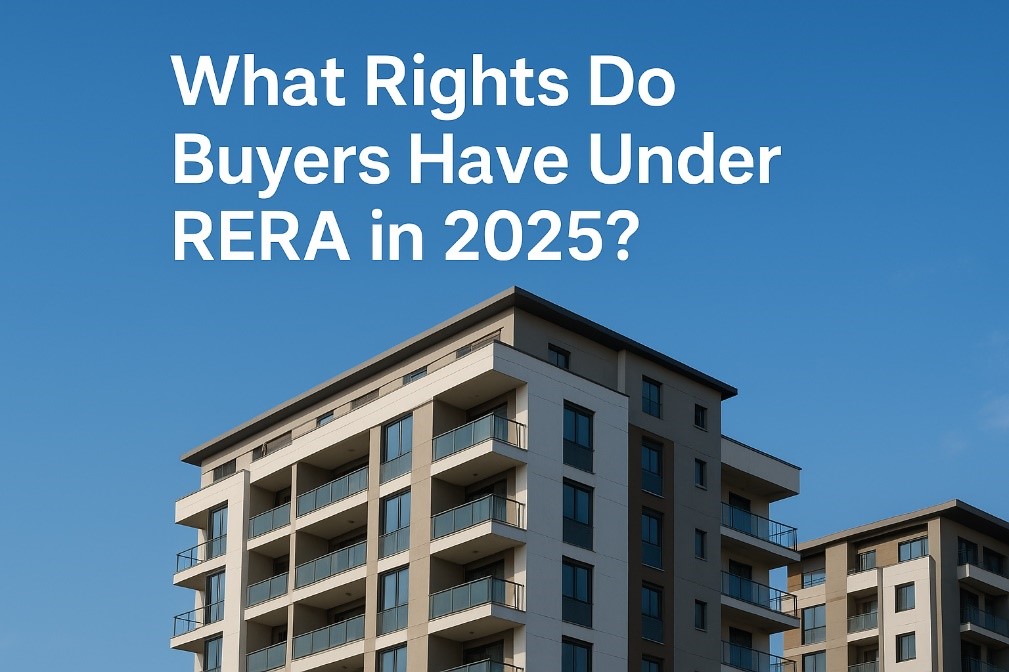The Real Estate (Regulation and Development) Act, 2016, commonly known as RERA, remains one of the most transformative reforms in India’s property sector. As of 2026, RERA continues to evolve—strengthening transparency, accountability, and buyer protection in the real estate market. Whether you’re investing in a new project, awaiting possession, or dealing with a construction delay, understanding what rights buyers have under RERA in 2026 is essential to protect your interests.
Let’s dive deep into the rights and duties of allottees under RERA, crucial legal provisions, and the real-life implications that every homebuyer must know before signing on the dotted line.
What Are the Key Rights of Homebuyers Under RERA in 2026?
The rights of homebuyers under RERA are explicitly defined to ensure fair dealing and timely delivery of projects. These include:
- Timely possession rights under RERA: Buyers are entitled to receive possession within the timeline promised in the agreement for sale.
- Right to information: Every buyer can access complete project details, including sanctioned plans, approvals, and construction status, on the RERA portal.
- Right to refund and interest: If a developer fails to deliver on time, buyers can seek RERA refund and interest (Section 18), which ensures repayment with a defined RERA interest rate for delay payment by buyer or developer.
- Right to structural safety: Developers are liable for structural defect liability (5 years under RERA) post-possession.
- Right to file a complaint: Any grievance can be raised through complaint filing on RERA portal 2026, ensuring digital accessibility and time-bound redressal.
These rights empower buyers to make informed decisions and hold erring developers accountable.
What Are the Rights and Duties of Allottees Under RERA?

While RERA primarily safeguards homebuyers, it also places certain obligations on them. The rights and duties of allottees under RERA include:
Rights:
- To obtain all relevant documents related to the project.
- To receive possession and a registered conveyance deed.
- To claim compensation in case of delay, defect, or false representation.
Duties:
- To make timely payments as per the agreement.
- To participate in the society handover process as per RERA rules for society handover pdf.
- To bear maintenance and related charges as outlined in RERA rules for maintenance charges.
In essence, RERA aims to maintain balance—while it ensures developers deliver, it expects buyers to uphold their contractual obligations.
What Are the Rights and Duties of Promoters Under RERA?

The rights and duties of promoters under RERA form the backbone of compliance. Developers must:
- Register projects before advertising or selling.
- Deposit 70 percent of buyer funds in an escrow account, ensuring funds are used only for that project.
- Provide quarterly updates on the RERA portal regarding construction status.
- Adhere strictly to MahaRERA rules for builders in Maharashtra and equivalent state authorities elsewhere.
Promoters also have the right to receive timely payments from buyers and impose RERA interest rate for delay payment by buyer if payments are delayed.
Failure to comply may lead to penalties under section 59 of RERA Act, which includes imprisonment or hefty fines.
What Happens If There Is a Violation of Section 13 of the RERA Act?

Violation of Section 13 of RERA Act occurs when a developer accepts advance payments without entering into a registered agreement for sale.
This section ensures:
- No more than 10% of the cost of the apartment or plot can be taken as advance before signing the agreement.
- Buyers get full transparency on payment milestones and project timelines.
In 2026, authorities are strictly enforcing this provision to prevent unauthorized fund collection practices.
How Does RERA Protect Buyers in Case of Project Delays?
RERA provides robust protection for delay-related grievances. Under RERA Section 18, buyers can either:
- Withdraw and claim refund with interest, or
- Continue with the project and claim compensation for delay.
The RERA compensation for delay 2026 provision ensures developers pay an interest rate comparable to what they charge buyers for delayed payments. This parity reinforces fairness and accountability.
How to Claim Refund With Interest Under RERA Section 18?
Wondering how to claim refund with interest under RERA Section 18? Here’s the process:
- Log in to the respective state RERA portal (for example, MahaRERA for Maharashtra).
- File a complaint under RERA refund and interest Section 18, mentioning the project registration number and supporting documents.
- The authority reviews the complaint and issues a refund order within the grievance redressal timeline of 60–90 days.
Buyers receive both the principal amount and interest, typically aligned with the State Bank of India’s MCLR + 2% as per the RERA interest rate guidelines.
What Are RERA Rules for Redevelopment Projects?

With an increasing number of societies opting for redevelopment, RERA rules for redevelopment have gained prominence. As per MahaRERA rules for builders:
- Redevelopment projects must be registered under RERA if new units are being sold.
- Existing society members must be treated as allottees with equal rights of allottees under RERA.
- Developers must execute agreements and ensure compliance with RERA rules for society handover post-completion.
This framework safeguards societies from exploitation and ensures transparent redevelopment practices.
What Are RERA Rules for Society Handover in 2026?

The RERA rules for society handover pdf outline the procedure for transferring building maintenance from the builder to residents. Key points include:
- Handover must occur within three months of obtaining the occupancy certificate.
- The builder must submit detailed accounts of maintenance charges, escrow balance, and service warranties.
- Any pending defect liability remains valid for five years as per structural defect liability 5 years RERA.
Failure to comply can lead to penalties under section 65 of RERA Act.
How Does RERA Handle Structural Defects After Possession?

Under RERA rules on structural defects after possession, the developer remains liable for five years from the date of possession.
Buyers can report any structural, workmanship, or quality defect during this period.
The promoter must rectify the defect within 30 days. If not, the buyer is entitled to compensation as per RERA Section 18.
This clause assures long-term protection and reinforces construction quality standards.
How Does RERA Manage Maintenance Charges and Transparency?

The RERA rules for maintenance charges demand clear disclosure of all recurring costs. Builders cannot levy arbitrary charges or change maintenance fees without consent.
Buyers must receive:
- A breakup of monthly and annual maintenance costs.
- Account details of the maintenance corpus fund.
These steps strengthen accountability during the society handover phase and post-possession management.
What Are the Offences, Penalties and Adjudication Under RERA Act?

RERA enforces a stringent framework for misconduct. The offences, penalties and adjudication under RERA Act include:
- Section 59 of RERA Act: Non-registration of project – punishable with up to 10% of project cost or imprisonment.
- Section 65 of RERA Act: Failure to comply with authority’s orders – penalty up to 5% of project cost.
- Section 69 of RERA Act: Real estate agent violations – imprisonment or fine for repeated offences.
This framework ensures every stakeholder, whether a developer, agent, or buyer, operates responsibly within the law.
What Are the Benefits of Investing in a RERA Approved Project?

RERA approved project benefits include:
- Legal protection and verified documents.
- Transparent pricing with no hidden costs.
- Assurance of timely delivery due to escrow 70 percent buyer funds rule.
- Verified project status accessible through the RERA digital portal integration 2026.
These advantages make RERA-registered projects the safest choice for buyers in 2026.
How to Check Project Details and Status on RERA Portal?

Buyers can easily learn how to check project details and status on RERA portal by:
- Visiting the official state RERA website.
- Searching using the builder’s name or project registration number.
- Viewing approvals, sanctioned plans, completion percentage, and complaint history.
This transparency minimizes fraud and enables data-backed investment decisions.
What Is the Grievance Redressal Process and Timeline?

RERA authorities follow a defined grievance redressal timeline of 60–90 days. The process includes:
- Filing an online complaint.
- Hearing before the Adjudicating Officer or RERA tribunal.
- Issuance of judgment or compensation order.
If unsatisfied, buyers can appeal before the RERA Appellate Tribunal. This swift process prevents legal delays common in pre-RERA times.
What Is the Buyer’s Right to Withdraw and Refund?

The buyer right to withdraw and refund applies if:
- The builder alters plans without consent.
- Possession is delayed beyond the agreed timeline.
- False promises are made in advertisements.
Buyers can seek full refund plus interest, ensuring complete financial protection under RERA refund and interest Section 18.
How Does RERA Promote Transparency Through Its Digital Portal Integration 2026?
The RERA digital portal integration 2026 initiative has merged state-level portals into a centralized system. It allows buyers to:
- Track national-level project data.
- Access the rights and duties of allottees under RERA instantly.
- File complaints online and monitor real-time status.
This digital leap makes RERA more accessible, transparent, and buyer-friendly than ever before.
What Rights Do Buyers Have in Redevelopment and Society Projects?
In RERA rules for redevelopment, buyers and society members have the right to:
- Fair agreement terms with no forced vacating without assurance of redevelopment timelines.
- Transparent disclosure of FSI usage, flat area, and completion schedule.
- Equitable treatment during allotment of redeveloped units.
These measures ensure redevelopment remains beneficial and transparent for all parties.
What Happens When a Developer Defaults?
If a developer defaults in delivering possession, violates agreement clauses, or fails to register under RERA:
- The authority can freeze project accounts.
- Impose penalties under section 59 or section 65 of RERA Act.
- In severe cases, the project can be taken over for completion by another agency under authority supervision.
This strengthens buyer faith and minimizes stalled projects across states.
Conclusion
RERA, as of 2026, stands as the cornerstone of homebuyer empowerment in India. It ensures that every buyer’s right to information, timely possession, and refund is protected under a legally robust mechanism. From escrow 70 percent buyer funds rule to structural defect liability for 5 years, every clause works toward a singular goal—fair and transparent real estate transactions.
At Housiey, we believe that an informed buyer is a protected buyer. Our platform not only connects you directly with verified builders but also ensures transparency throughout your home-buying journey.
To explore how developers are penalized for non-compliance, read our detailed blog on “RERA Penalties for Developers.”
FAQs
The Real Estate (Regulation and Development) Act, 2016, commonly known as RERA, remains one of the most transformative reforms in India’s property sector. As of 2026, RERA continues to evolve—strengthening transparency, accountability, and buyer protection in the real estate market. Whether you’re investing in a new project, awaiting possession, or dealing with a construction delay, understanding what rights buyers have under RERA in 2026 is essential to protect your interests.
Let’s dive deep into the rights and duties of allottees under RERA, crucial legal provisions, and the real-life implications that every homebuyer must know before signing on the dotted line.
What Are the Key Rights of Homebuyers Under RERA in 2026?
The rights of homebuyers under RERA are explicitly defined to ensure fair dealing and timely delivery of projects. These include:
- Timely possession rights under RERA: Buyers are entitled to receive possession within the timeline promised in the agreement for sale.
- Right to information: Every buyer can access complete project details, including sanctioned plans, approvals, and construction status, on the RERA portal.
- Right to refund and interest: If a developer fails to deliver on time, buyers can seek RERA refund and interest (Section 18), which ensures repayment with a defined RERA interest rate for delay payment by buyer or developer.
- Right to structural safety: Developers are liable for structural defect liability (5 years under RERA) post-possession.
- Right to file a complaint: Any grievance can be raised through complaint filing on RERA portal 2026, ensuring digital accessibility and time-bound redressal.
These rights empower buyers to make informed decisions and hold erring developers accountable.
What Are the Rights and Duties of Allottees Under RERA?

While RERA primarily safeguards homebuyers, it also places certain obligations on them. The rights and duties of allottees under RERA include:
Rights:
- To obtain all relevant documents related to the project.
- To receive possession and a registered conveyance deed.
- To claim compensation in case of delay, defect, or false representation.
Duties:
- To make timely payments as per the agreement.
- To participate in the society handover process as per RERA rules for society handover pdf.
- To bear maintenance and related charges as outlined in RERA rules for maintenance charges.
In essence, RERA aims to maintain balance—while it ensures developers deliver, it expects buyers to uphold their contractual obligations.
What Are the Rights and Duties of Promoters Under RERA?

The rights and duties of promoters under RERA form the backbone of compliance. Developers must:
- Register projects before advertising or selling.
- Deposit 70 percent of buyer funds in an escrow account, ensuring funds are used only for that project.
- Provide quarterly updates on the RERA portal regarding construction status.
- Adhere strictly to MahaRERA rules for builders in Maharashtra and equivalent state authorities elsewhere.
Promoters also have the right to receive timely payments from buyers and impose RERA interest rate for delay payment by buyer if payments are delayed.
Failure to comply may lead to penalties under section 59 of RERA Act, which includes imprisonment or hefty fines.
What Happens If There Is a Violation of Section 13 of the RERA Act?

Violation of Section 13 of RERA Act occurs when a developer accepts advance payments without entering into a registered agreement for sale.
This section ensures:
- No more than 10% of the cost of the apartment or plot can be taken as advance before signing the agreement.
- Buyers get full transparency on payment milestones and project timelines.
In 2026, authorities are strictly enforcing this provision to prevent unauthorized fund collection practices.
How Does RERA Protect Buyers in Case of Project Delays?
RERA provides robust protection for delay-related grievances. Under RERA Section 18, buyers can either:
- Withdraw and claim refund with interest, or
- Continue with the project and claim compensation for delay.
The RERA compensation for delay 2026 provision ensures developers pay an interest rate comparable to what they charge buyers for delayed payments. This parity reinforces fairness and accountability.
How to Claim Refund With Interest Under RERA Section 18?
Wondering how to claim refund with interest under RERA Section 18? Here’s the process:
- Log in to the respective state RERA portal (for example, MahaRERA for Maharashtra).
- File a complaint under RERA refund and interest Section 18, mentioning the project registration number and supporting documents.
- The authority reviews the complaint and issues a refund order within the grievance redressal timeline of 60–90 days.
Buyers receive both the principal amount and interest, typically aligned with the State Bank of India’s MCLR + 2% as per the RERA interest rate guidelines.
What Are RERA Rules for Redevelopment Projects?

With an increasing number of societies opting for redevelopment, RERA rules for redevelopment have gained prominence. As per MahaRERA rules for builders:
- Redevelopment projects must be registered under RERA if new units are being sold.
- Existing society members must be treated as allottees with equal rights of allottees under RERA.
- Developers must execute agreements and ensure compliance with RERA rules for society handover post-completion.
This framework safeguards societies from exploitation and ensures transparent redevelopment practices.
What Are RERA Rules for Society Handover in 2026?

The RERA rules for society handover pdf outline the procedure for transferring building maintenance from the builder to residents. Key points include:
- Handover must occur within three months of obtaining the occupancy certificate.
- The builder must submit detailed accounts of maintenance charges, escrow balance, and service warranties.
- Any pending defect liability remains valid for five years as per structural defect liability 5 years RERA.
Failure to comply can lead to penalties under section 65 of RERA Act.
How Does RERA Handle Structural Defects After Possession?

Under RERA rules on structural defects after possession, the developer remains liable for five years from the date of possession.
Buyers can report any structural, workmanship, or quality defect during this period.
The promoter must rectify the defect within 30 days. If not, the buyer is entitled to compensation as per RERA Section 18.
This clause assures long-term protection and reinforces construction quality standards.
How Does RERA Manage Maintenance Charges and Transparency?

The RERA rules for maintenance charges demand clear disclosure of all recurring costs. Builders cannot levy arbitrary charges or change maintenance fees without consent.
Buyers must receive:
- A breakup of monthly and annual maintenance costs.
- Account details of the maintenance corpus fund.
These steps strengthen accountability during the society handover phase and post-possession management.
What Are the Offences, Penalties and Adjudication Under RERA Act?

RERA enforces a stringent framework for misconduct. The offences, penalties and adjudication under RERA Act include:
- Section 59 of RERA Act: Non-registration of project – punishable with up to 10% of project cost or imprisonment.
- Section 65 of RERA Act: Failure to comply with authority’s orders – penalty up to 5% of project cost.
- Section 69 of RERA Act: Real estate agent violations – imprisonment or fine for repeated offences.
This framework ensures every stakeholder, whether a developer, agent, or buyer, operates responsibly within the law.
What Are the Benefits of Investing in a RERA Approved Project?

RERA approved project benefits include:
- Legal protection and verified documents.
- Transparent pricing with no hidden costs.
- Assurance of timely delivery due to escrow 70 percent buyer funds rule.
- Verified project status accessible through the RERA digital portal integration 2026.
These advantages make RERA-registered projects the safest choice for buyers in 2026.
How to Check Project Details and Status on RERA Portal?

Buyers can easily learn how to check project details and status on RERA portal by:
- Visiting the official state RERA website.
- Searching using the builder’s name or project registration number.
- Viewing approvals, sanctioned plans, completion percentage, and complaint history.
This transparency minimizes fraud and enables data-backed investment decisions.
What Is the Grievance Redressal Process and Timeline?

RERA authorities follow a defined grievance redressal timeline of 60–90 days. The process includes:
- Filing an online complaint.
- Hearing before the Adjudicating Officer or RERA tribunal.
- Issuance of judgment or compensation order.
If unsatisfied, buyers can appeal before the RERA Appellate Tribunal. This swift process prevents legal delays common in pre-RERA times.
What Is the Buyer’s Right to Withdraw and Refund?

The buyer right to withdraw and refund applies if:
- The builder alters plans without consent.
- Possession is delayed beyond the agreed timeline.
- False promises are made in advertisements.
Buyers can seek full refund plus interest, ensuring complete financial protection under RERA refund and interest Section 18.
How Does RERA Promote Transparency Through Its Digital Portal Integration 2026?
The RERA digital portal integration 2026 initiative has merged state-level portals into a centralized system. It allows buyers to:
- Track national-level project data.
- Access the rights and duties of allottees under RERA instantly.
- File complaints online and monitor real-time status.
This digital leap makes RERA more accessible, transparent, and buyer-friendly than ever before.
What Rights Do Buyers Have in Redevelopment and Society Projects?
In RERA rules for redevelopment, buyers and society members have the right to:
- Fair agreement terms with no forced vacating without assurance of redevelopment timelines.
- Transparent disclosure of FSI usage, flat area, and completion schedule.
- Equitable treatment during allotment of redeveloped units.
These measures ensure redevelopment remains beneficial and transparent for all parties.
What Happens When a Developer Defaults?
If a developer defaults in delivering possession, violates agreement clauses, or fails to register under RERA:
- The authority can freeze project accounts.
- Impose penalties under section 59 or section 65 of RERA Act.
- In severe cases, the project can be taken over for completion by another agency under authority supervision.
This strengthens buyer faith and minimizes stalled projects across states.
Conclusion
RERA, as of 2026, stands as the cornerstone of homebuyer empowerment in India. It ensures that every buyer’s right to information, timely possession, and refund is protected under a legally robust mechanism. From escrow 70 percent buyer funds rule to structural defect liability for 5 years, every clause works toward a singular goal—fair and transparent real estate transactions.
At Housiey, we believe that an informed buyer is a protected buyer. Our platform not only connects you directly with verified builders but also ensures transparency throughout your home-buying journey.
To explore how developers are penalized for non-compliance, read our detailed blog on “RERA Penalties for Developers.”
FAQs



















